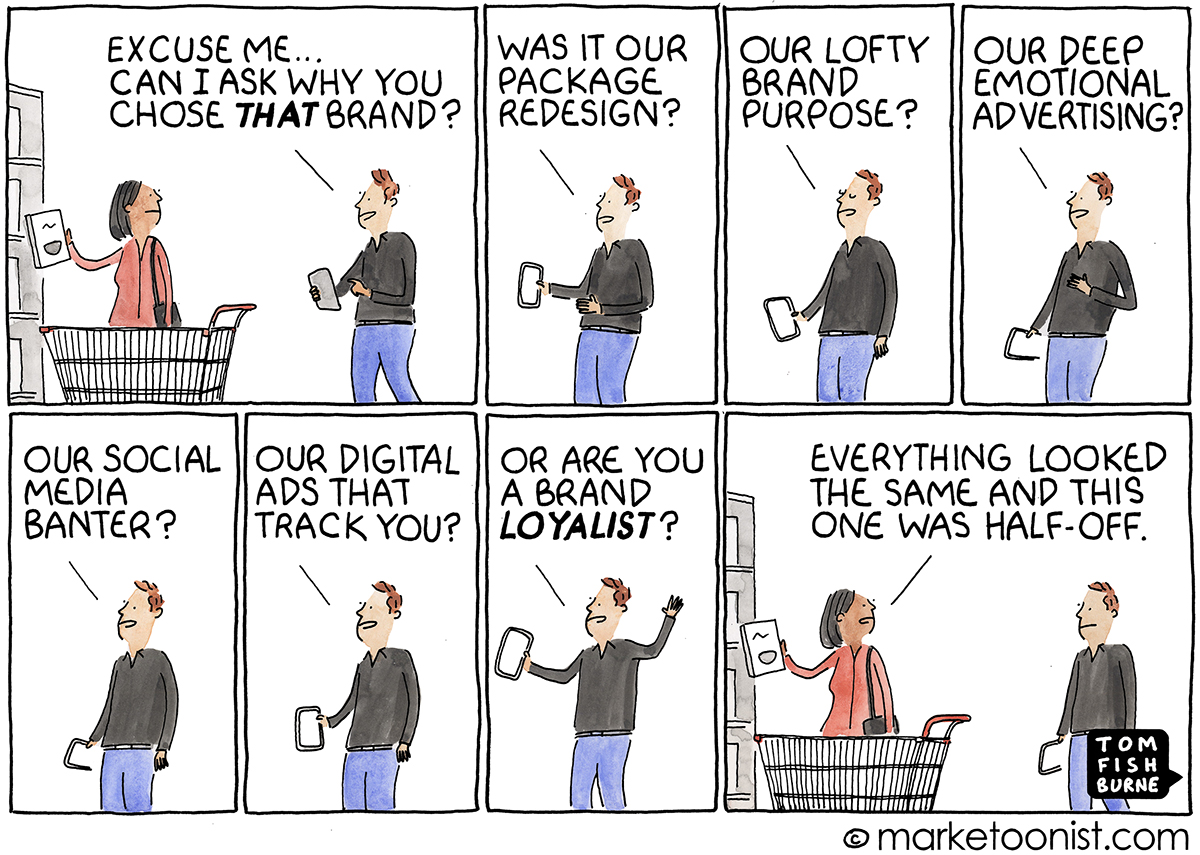Can’t Buy Me Brand Love
So, Aladdin gets into the cave and finds an old lamp. Aladdin rubs the old lamp to give it a wee clean and out pops a genie. A fucking genie. Genie has three wishes that he can bestow on Aladdin...
Excitedly, Aladdin starts to imagine his heart's desire. But Genie throws out some ground rules. Genie can't kill anyone, he can't bring anyone back from the dead, and he can't make anyone fall in love with you.
Aladdin is bereft. He really wanted the Genie to make people fall in love with his new mindfulness app so it could get better word of mouth which would make people download it more.
Gutted, Aladdin throws the lamp back in the pile of gold and heads home to update his marketing plan's "Brand Love" metric.
So, if a Genie, bestower of the power cosmic, can't make someone fall in love with you, how on earth do you think brand consultancies can make people fall in love with your brand?
Brand Love is one of these phrases that pop up from time to time. Sometimes, you even get it as a goal in a client brief, "want customers to love our XXX brand". The trouble is brand love is, as a metric, nonsense.
Here's why:
Tainted love
People don't really care about brands. I write that as a brand person. I care very deeply about brands, what makes people choose one brand over another. How to push the perceived value of a brand. I love it, find it endlessly fascinating and think that what we do can help make better businesses. Brand strategy is business strategy. But this cartoon from the Marktoonist sums it how people feel about brands 95% of the time.

Our customers don't care. That's the truth. At the very best, we use brands to navigate the choices we have. We've been doing that since the first man smacked a branding iron on a cow's arse. It's a useful guide for choosing something over another something. USEFUL. But do you love it? No. No, you don't.
Now, I did say that people consider brands in a perfectly functional way 95% of the time. What about the other 5%, I hear you cry? People may behave on autopilot for most brands but what about the Lego, the Patagonias, the Nikes of the world? What about them, fat boy?
How deep is your love?
Let's start by acknowledging that people say that they love a lot of things. People love a clean toilet. People love that picture of Boris Johnson hanging off a wire looking like a prat. People love dressing up like a dog and eating out of a bowl for their sexual pleasure. Whatever gets you through the night. Love has never been so popular.
What's love got to do, got to do with it?
But when it comes to brand, Tina's got a point. When we say we love brands, what's love but a second-hand emotion? People say 'love' as a shorthand for other emotions. I do it myself. I 'love' my Airpods. But that's not really what I mean. I love my children more. Really. When I say I love my AirPods, it's a shorthand for easy, simple to use, I like what it says about me, I like the sound, I like the integration with iOS, I like the crazy spatial audio nonsense it does. Is that love? Of course, it isn't. It's a shorthand for something that makes my life easier. And making your customer's life easier is a very, very good thing. That's a metric worth measuring. Measuring brand love only hides things behind an emotional response.
Love will tear us apart
So, what should we aim for? At the risk of getting all brand wanky, what you're hoping for, at best, is to develop a non-rational disposition towards your brand than others. Have I just swapped one nonsensical phrase with another? I don't think so, I think that I'm trying to accurately describe an aspect of what you're trying to achieve from your campaign. Rationally, people should buy from the UK shoe shop, Clarks, but instead, they'll buy a pair of Yeezys. Do they love the Yeezy brand? Yes, but that's an emotional response to the brand, the endpoint of a thousand decisions that help people more likely to buy.
Yes, you can wrap that up as "brand love", but it isn't accurate on outcome, and you probably deserves to be punched for looking to find a metric around it. Understanding the quality cues you need to put in place to make your product desirable or useful is key to your product or service's success.
Rather than aiming for one measurement, "brand love", look to understand how people are experiencing your product or service. Put measurements around that so that you can try to improve on tangible things like customer service or ease of use, not nebulous concepts like 'love'.
Have I gone around in a circle and just validated brand love? I hope not. Brand Love isn't a useful phrase, it's hard to measure, and it's not really what your customers are fundamentally looking for.
Speaking from bitter, bitter experience, those who chase love tend not to find it. By being yourself, authentic, honest, helpful and useful, your potential customers will find a small place for you in their day today. If you focus on this rather than the abstract, you may well find that love blooms, love that ends in a happy ever after rather than starting at once upon a time.
We we took a deeper dive into the topic of brand love on our podcast, the Good Round Up. Have a listen below.